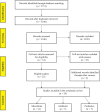Gut Microbiota Profiles and Microbial-Based Therapies in Post-operative Crohn's Disease: A Systematic Review
- PMID: 33585513
- PMCID: PMC7876235
- DOI: 10.3389/fmed.2020.615858
Gut Microbiota Profiles and Microbial-Based Therapies in Post-operative Crohn's Disease: A Systematic Review
Abstract
Background and Aims: Gut microbiota recolonization after intestinal resection had been reported to be associated with post-operative recurrence in Crohn's disease (CD). However, the results of different studies are inconsistent and even contradictory. In addition, knowledge on the efficacy of microbial-based therapies in preventing post-operative recurrence of CD is limited. Therefore, the aim of this review was to investigate gut microbiota profiles in patients with CD before and after surgery and evaluate microbial-based therapies in preventing post-operative recurrence. Methods: Electronic databases were searched from inception to 31 June 2020 using predefined terms. Studies that investigated gut microbiota pre- and post-intestinal resection, and microbial-based therapies in preventing post-operative recurrence, were eligible. Study quality was assessed using either the Newcastle-Ottawa scale or Jadad scoring system. Results: Twelve studies investigating gut microbiota of CD patients suffering from operation, and other 12 studies evaluating the efficacy of antibiotics and probiotics, were included in our review. The mucosa-associated microbiota in surgical biopsy of CD patients is significantly distinct from that in normal mucosa from healthy subjects. Gut microbiota recolonization following surgery might be associated with post-operative recurrence in CD patients. Furthermore, CD patients with post-operative recurrence presented a gain in pro-inflammatory pathogenic bacteria and a loss in short-chain fatty acid-producing bacteria before and after surgery. However, no consistent bacteria or metabolites were found to predict the post-operative recurrence of CD. Additionally, microbial-based therapies are deficient and present restricted widespread clinical utility due to several deficiencies. Conclusion: Recurrence-associated bacteria observed pre- and post- operation might be promising in preventing the post-operative recurrence of CD. Furthermore, potential microbe biomarkers for predicting subsequent disease recurrence should be validated with larger sample sizes using more rigorous and standardized methodologies.
Keywords: crohn's disease; feces-associated microbiota; microbial-based therapies; mucosa-associated microbiota; post-operative recurrence.
Copyright © 2021 Zhuang, Tian, Li, Mao, Li, Zhao, Xiong, Zeng, Feng and Chen.
Conflict of interest statement
The authors declare that the research was conducted in the absence of any commercial or financial relationships that could be construed as a potential conflict of interest.
Figures
Similar articles
-
Crohn's disease recurrence updates: first surgery vs. surgical relapse patients display different profiles of ileal microbiota and systemic microbial-associated inflammatory factors.Front Immunol. 2022 Jul 29;13:886468. doi: 10.3389/fimmu.2022.886468. eCollection 2022. Front Immunol. 2022. PMID: 35967326 Free PMC article.
-
Association of gut microbiota with post-operative clinical course in Crohn's disease.BMC Gastroenterol. 2013 Aug 22;13:131. doi: 10.1186/1471-230X-13-131. BMC Gastroenterol. 2013. PMID: 23964800 Free PMC article.
-
Gut Microbiota Profile in Pediatric Patients With Inflammatory Bowel Disease: A Systematic Review.Front Pediatr. 2021 Feb 2;9:626232. doi: 10.3389/fped.2021.626232. eCollection 2021. Front Pediatr. 2021. PMID: 33604319 Free PMC article.
-
Characteristics of mucosa-associated gut microbiota during treatment in Crohn's disease.World J Gastroenterol. 2019 May 14;25(18):2204-2216. doi: 10.3748/wjg.v25.i18.2204. World J Gastroenterol. 2019. PMID: 31143071 Free PMC article.
-
Factors affecting recurrence after surgery for Crohn's disease.World J Gastroenterol. 2005 Jul 14;11(26):3971-9. doi: 10.3748/wjg.v11.i26.3971. World J Gastroenterol. 2005. PMID: 15996018 Free PMC article. Review.
Cited by
-
Integration and implementation of precision medicine in the multifaceted inflammatory bowel disease.World J Gastroenterol. 2023 Sep 28;29(36):5211-5225. doi: 10.3748/wjg.v29.i36.5211. World J Gastroenterol. 2023. PMID: 37901450 Free PMC article. Review.
-
The Role of Oral Probiotics in Alleviating Inflammation, Symptom Relief, and Postoperative Recurrence and Their Side Effects in Adults With Crohn's Disease: A Systematic Review.Cureus. 2023 Dec 21;15(12):e50901. doi: 10.7759/cureus.50901. eCollection 2023 Dec. Cureus. 2023. PMID: 38259373 Free PMC article. Review.
-
Efficacy and safety of probiotics in IBD: An overview of systematic reviews and updated meta-analysis of randomized controlled trials.United European Gastroenterol J. 2024 Sep;12(7):960-981. doi: 10.1002/ueg2.12636. Epub 2024 Aug 6. United European Gastroenterol J. 2024. PMID: 39106167 Free PMC article.
-
Comprehensive Phenotyping in Inflammatory Bowel Disease: Search for Biomarker Algorithms in the Transkingdom Interactions Context.Microorganisms. 2022 Nov 4;10(11):2190. doi: 10.3390/microorganisms10112190. Microorganisms. 2022. PMID: 36363782 Free PMC article.
-
A Diet Fortified with Anthocyanin-Rich Extract (RED) Reduces Ileal Inflammation in a Senescence-Prone Mice Model of Crohn's-Disease-like Ileitis.Antioxidants (Basel). 2025 Apr 15;14(4):473. doi: 10.3390/antiox14040473. Antioxidants (Basel). 2025. PMID: 40298846 Free PMC article.
References
Publication types
LinkOut - more resources
Full Text Sources
Other Literature Sources


